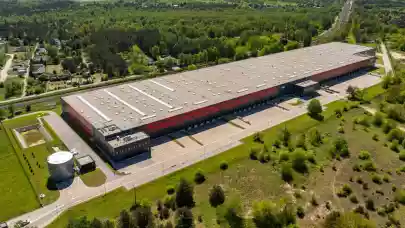
According to the latest RICS Commercial Property Monitor, occupier and investment sentiment remains mostly positive across main CEE markets with the exception of Bulgaria where the outlook is slightly negative. Retail continues to suffer across the region as demand for retail assets fell on both the occupier and investment sides of the market in most countries.
Declined tenant demand for retail space
In the last quarter of 2019, the value of the RICS Occupier Sentiment Indicator (an overall measure of occupier market momentum) increased in the Czech Republic, Hungary and Romania. In Bulgaria, the index slipped into negative territory for the first time since 2013, signalling that market conditions have largely stalled. In Poland, the index decreased into neutral territory for the first time in two years.
Occupier demand increased at the headline level in all CEE countries covered by the RICS, except for the Czech Republic. In Hungary and Romania, demand continued to rise firmly across all three market sectors. The picture was more mixed in Bulgaria, the Czech Republic and Poland, where occupier demand increased in the office and industrial sectors, while tenant enquiries fell in the retail sector. In Bulgaria, this happened for the first time since 2015.
Availability of leasable space increased firmly in Bulgaria, Poland and Romania, remained unchanged in the Czech Republic and declined in Hungary.
12-month rental expectations were downgraded in all CEE markets except for Hungary The outlook, however, is positive for prime office and industrial properties in every country. In the Czech Republic and Hungary, only secondary retail rents are expected to fall, while in Poland and Romania all secondary markets have a negative outlook. In Poland, retail rents are expected to fall even in prime locations. Bulgaria is the only country in the region where rents are expected to fall at the all-property level. The outlook in Bulgaria is most downbeat for secondary segments, especially offices.
Weaker investment demand in Bulgaria
The value of the RICS Investment Sentiment Indicator (an overall measure of the investment market) increased in the Czech Republic and Poland, while it decreased in Bulgaria, Hungary and Romania. Thus, Hungary lost its position as the country with the highest reading globally, Still, three of the ten countries with the strongest investment sentiment globally (among the 40 countries surveyed by the RICS) are in CEE – the Czech Republic (#4), Romania (#5) and Hungary (#8). Within the region, Bulgaria is the only country where the index value stands in negative territory.
Investment enquiries (both domestic and foreign) increased in four of the five CEE countries covered in this report, with Bulgaria being the exception. The Bulgarian results were driven by a fall in demand across the retail and office sectors whilst demand for industrial properties continued to rise firmly. While in Hungary and Romania, demand grew strongly across all asset classes, investor demand for retail properties fell in the Czech Republic and Poland.
The supply of property for investment purposes increased in Bulgaria, Poland and Romania. It remained unchanged in the Czech Republic and Hungary.
Capital value projections remained unchanged in the Czech Republic, while respondents revised down their capital value projections in Bulgaria, Hungary and Poland. Contributors in the Czech Republic, Poland and Romania envisage solid capital value gains only for prime office and industrial assets. Capital value projections for secondary retail assets are negative in Bulgaria, the Czech Republic, Poland and Romania. In Bulgaria, capital value expectations are actually negative across all secondary markets.
Market valuations have become more mixed
The share of those that feel that commercial property prices are expensive has increased in Bulgaria and Hungary, while the share of those that feel that the market offer fair value at present increased in the Czech Republic, Poland and Romania.
In the Czech Republic, 85% of respondents feel that the market has reached the peak of the property cycle. In Hungary, most respondents (56%) believe that the market is nearing the peak, while in Romania the majority (48%) thinks that the market is in the upturn phase. In Bulgaria, 50% of contributors now believe that the market is in the downturn phase (up from just 11% in Q3). The picture is a lot more mixed in Poland, where 33% feels that the market has peaked, 29% feels that the market is in the upturn phase and 25% feels that it is already in the downturn phase.
On balance, credit conditions improved in Bulgaria, the Czech Republic and Hungary, while they remained unchanged in Poland. For the first time since 2017, contributors in Romania also noted an improvement in credit conditions.
“We expect investment demand and values to further increase in Austria this year, while tenand demand is faced with an undersupply of good office space in Vienna. In CEE we expect higher values for office and industrial. And we should finally see more investment transactions in Romania, due to an ever-increasing yield differential compared to countries like Poland, Czech Republic and Hungary. Office markets are increasingly influenced by a lack of available staff, where Prague seems to be most affected so far. And there are first examples of residential investments in the core CEE markets,” Dr. Andreas Ridder FRICS, Managing Director Austria & CEE at CBRE commented.

Andreas Ridder FRICS
Chairman CEE
CBRE
Strong investment sentiment persists in Austria
For the third quarter in a row, enough responses have been submitted for a report to be published on the Austrian market. While the value of the OSI shows stagnation, the value of the ISI remained firmly positive, making Austria the market with the seventh-strongest reading globally.
Driving the flat OSI reading, reasonably solid tenant demand growth in the office and industrial sectors was offset by a sharp decline in demand for retail space. The rental outlook for the next 12 months is moderately positive with a decline in rental values only expected for secondary retail assets.
On the investment side of the market, enquiries (both domestic and international) continued to rise smartly in the office and industrial sectors. Meanwhile, domestic investor demand was broadly flat for retail assets, although foreign enquiries did reportedly rise. Capital values are expected to rise in all prime areas of the market in the coming twelve months, with each sector seeing upward revisions relative to Q3. In contrast, expectations for secondary retail values remain stuck in negative territory.
The vast majority of respondents feel that commercial real estate prices across Austria have moved above fair value. At the same time, 72% of survey participants believe that the market has reached the peak of the current property cycle.



